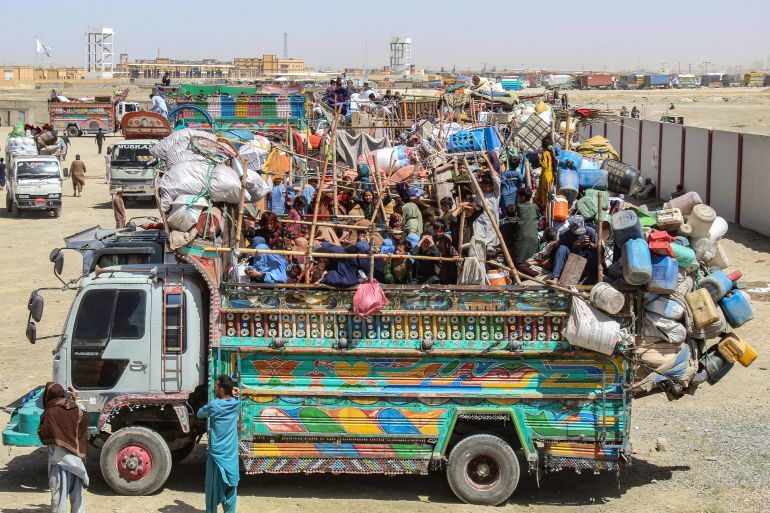Pakistan confirms its expulsion of more than 80,000 Afghans since April 1
Rights groups have criticised the repatriation drive, warning that mass expulsions risk endangering vulnerable people.

Published On 18 Apr 202518 Apr 2025
Pakistan has confirmed to have repatriated more than 80,000 Afghan nationals since April 1, before an extended April 30 deadline for the country’s largest migrant group in an initiative labelled as “forced deportation” by Afghanistan.
Talal Chaudhry, Pakistan’s Interior Ministry adviser, told reporters in Islamabad on Friday that there would be no more extensions to the Illegal Foreigners Repatriation Plan launched in late 2023 for more than three million Afghans.
Recommended Stories
list of 3 items
Pakistan accelerates deportation of Afghans: UN
end of list
“We have communicated clear instructions to all provinces, if anyone gives a shop, house, or any kind of space to an illegal foreigner, they will be held accountable under the law,” he said.
Those lacking valid documents or holding Afghan Citizen Cards had initially been ordered to leave by March 31. That deadline was later extended by a month.
On Tuesday, the International Organization for Migration, a UN entity, said Pakistan has expelled nearly 60,000 Afghans since the start of April.
“With a new wave of large-scale returns now under way from Pakistan, needs on the ground are rising rapidly – both at the border and in areas of return that are struggling to absorb large numbers of returnees,” Mihyung Park, head of the IOM’s Afghanistan mission, said at the time.
Advertisement
More than 1.3 million Afghans who hold Proof of Registration cards from the UN refugee agency, UNHCR, have also been told to move outside the capital Islamabad and the neighbouring city of Rawalpindi.
On Saturday, Pakistan’s Foreign Minister Ishaq Dar is due to visit Kabul, where he will head a delegation for high-level talks with the Taliban-led government.
“The talks will cover the entire gamut of the Pakistan-Afghan relationship, focusing on ways and means to deepen cooperation in all areas of mutual interests, including security, trade, connectivity, and people-to-people ties,” said a statement from Pakistan’s foreign office.
‘We have no desire to leave’
The crackdown threatens to uproot Afghan families that have been in the country for decades.
Earlier this month, Akber Khan, who owns a restaurant in the northwest Pakistani city of Peshawar, told The Associated Press news agency: “I have been here for almost 50 years. I got married here, so did my children, and 10 of my family members are buried here. That’s why we have no desire to leave.”
At least a third of the Afghans Pakistan wants to expel this year live in the northwest province of Khyber Pakhtunkhwa.
“Afghans can never be completely repatriated, especially from Khyber Pakhtunkhwa, as they return using illegal channels or exploiting loopholes in the system despite fencing at the border,” said Abdullah Khan, managing director of the Pakistan Institute for Conflict and Security Studies, to Al Jazeera.
‘Security threat’
Islamabad has frequently linked Afghan refugees to rising security threats and criminal activity within its borders – allegations rejected by Kabul, which has described the campaign as forced deportation and politically motivated.
Advertisement
Authorities in Pakistan say they have established temporary holding centres across multiple cities to process and accommodate Afghan nationals before their return.
Most are being transported to the Torkham border crossing in Khyber Pakhtunkhwa province, the key route into eastern Afghanistan.
Human rights groups have criticised the repatriation drive, warning that mass expulsions risk endangering vulnerable people, particularly women and children, who may face insecurity or persecution upon return.
Despite these concerns, Pakistani officials maintain that the crackdown targets only those who remain in the country without legal authorisation, insisting the policy is a matter of national security.
